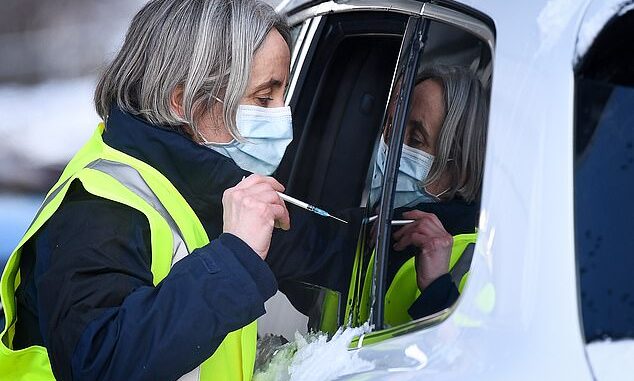
Young Britons could get a Covid jab from a drive-thru clinic on their way to work.
Heath chiefs said the NHS must adopt ‘innovative delivery modes’ as the vaccine rollout expands to younger groups.
NHS board meeting documents state: ‘Reaching a more mobile, largely working-age population with lower Covid-19-related health risk will bring different challenges, especially as lockdown and more [restrictions] are lifted.
‘We have developed operational guidance for drive-thru, mobile and pop-up models to enable targeted delivery.’
Ministers promised to offer a vaccine to over-50s by April 15. It comes as the British Medical Association said GPs can offer jabs to over-40s if they have exhausted efforts to reach those eligible.
NHS England stressed phase two would begin only when authorised, but the doctors’ union said members had discretion to jab to prevent waste.
The NHS has administered 32,325,993 jabs, of which 29,316,130 are first doses, a daily rise of 324,942. And 3,009,863 are second doses, an increase of 234,382.
The NHS is making plans for a re-vaccination programme this autumn, if research shows a ‘booster’ shot is needed to tackle mutant strains.
This may be given at the same time as the annual flu jab, with officials now ‘exploring possibilities for co-administration’.
People are currently advised to leave a gap of at least seven days between the two so it is easier to tell which has caused side-effects, if any.
The papers say: ‘It is not currently known for how long people who receive a COVID-19 vaccine will be protected.
‘This is because, as is the case with many vaccines, the protection they confer may weaken over time.
‘It is also possible that new variants of the virus may emerge against which current vaccines are less effective.
‘As well as working closely with manufacturers, scientists are assessing the impact of some Variants of Concern on the vaccines currently in deployment.
‘To ensure the country is prepared for these scenarios and while further evidence is gathered, the NHS is planning for a revaccination campaign, which is likely to run later this year in autumn or winter.
‘We are planning on the basis that we will need to run COVID-19 and seasonal flu vaccination campaigns in parallel.’
Children may also be given the Covid vaccine, if trials show it is safe and effective in this age group.
The UK is locked in a row with the EU and India over access to supplies manufactured in their countries, raising fears about shortages.
But the NHS England board papers say they are still on track to hit targets ‘in spite of changes to the supply schedule’.
It comes after a trial that delivered 2,300 Covid jabs in just one day at a car park near Bury St Edmunds, Suffolk, was 360 per cent more effective than an equivalent clinic, The Mirror reported.
But while the system continues to run smoothly, health bosses said the scheme was unlikely to be scaled up to its full potential due to issues with supply.
Dr Richard West, a senior GP at Woolpit Health Centre, created the drive-through trial at his practice and believes up to 6,000 people could be vaccinated in one weekend if the supply of jabs was reliable.
He is one of a handful of enterprising GPs who have set up their own drive-in jab centres, despite NHS chiefs’ failure to back the initiative.
Despite the backing of health minister Jo Churchill, Dr West’s local MP, the centre has not been supported by the Department of Health and NHS England.
Dr West said he could run drive-through jabbing sessions several times a week, but added that the practice does not have access to enough doses.
He said: ‘We did one in the snow in February and haven’t done one since. I’ve had the support of local clinical commissioning group but not NHS England. We’d do another tomorrow if we could but can’t get the vaccine.’
If drive-through clinics were used in each London borough 4.5million people could be vaccinated in the capital every month.
This is depending on a seven-day service and each London borough having at least one drive-through service.
Experts have suggested the figure could be double across the country.
GP surgeries can vaccinate an around 500 people a day on average, meaning a drive-through system is almost five times as quick.
END

Be the first to comment